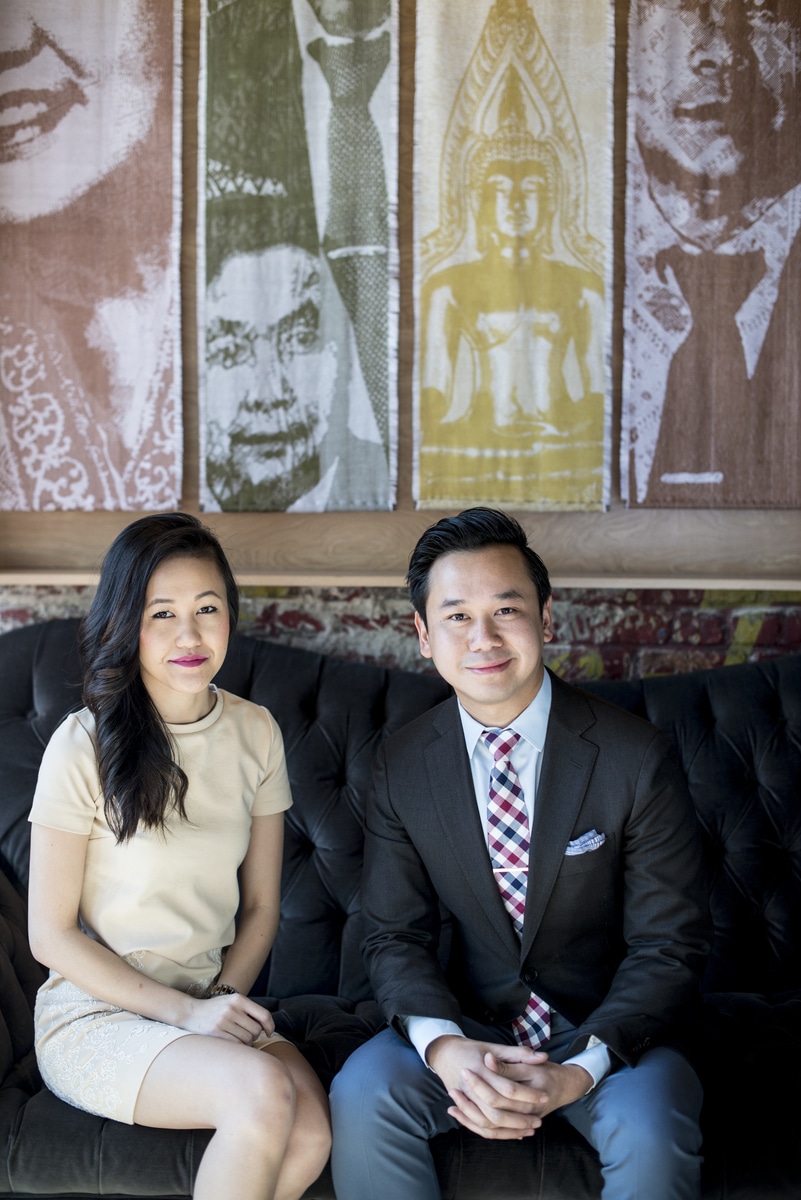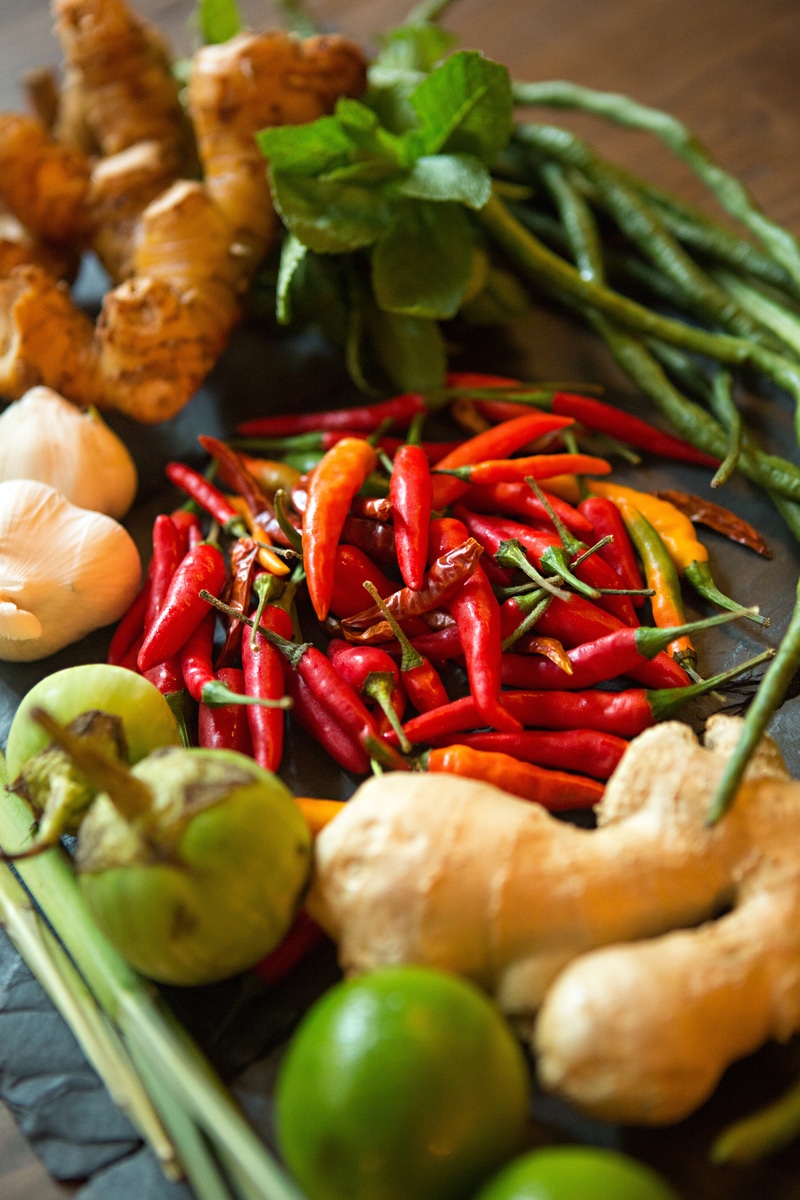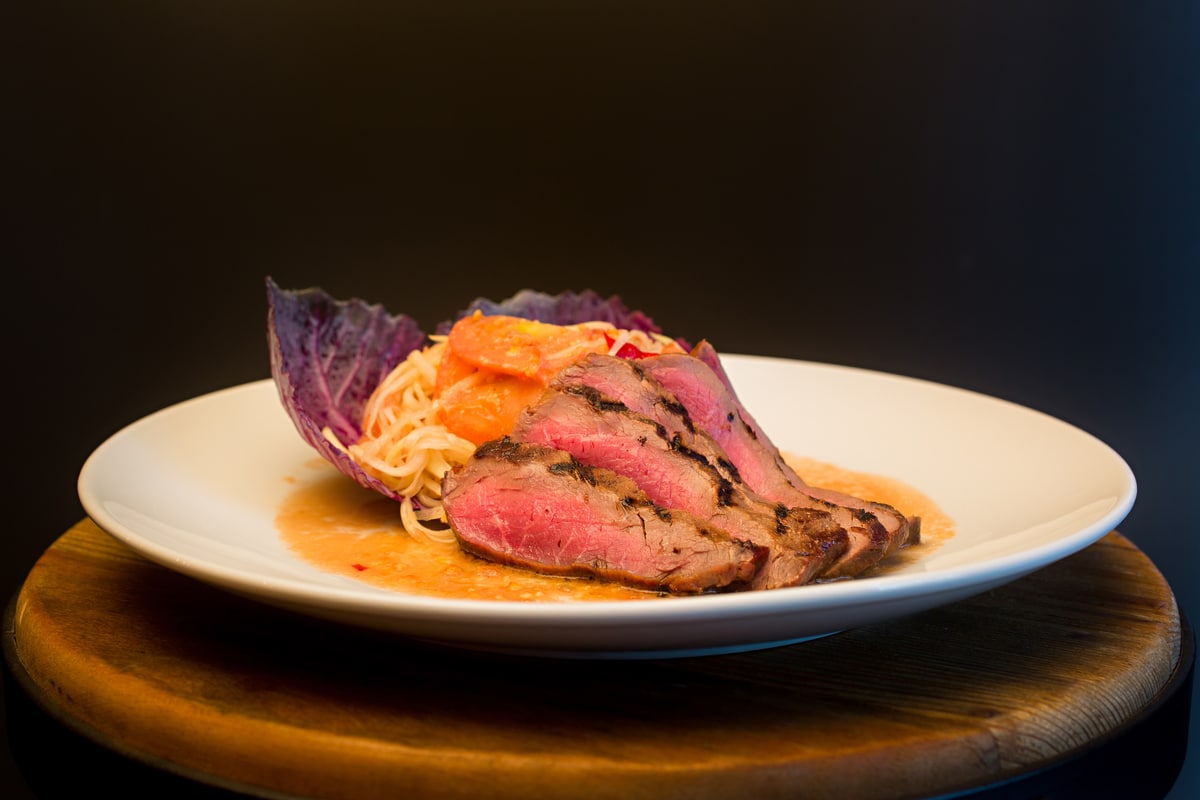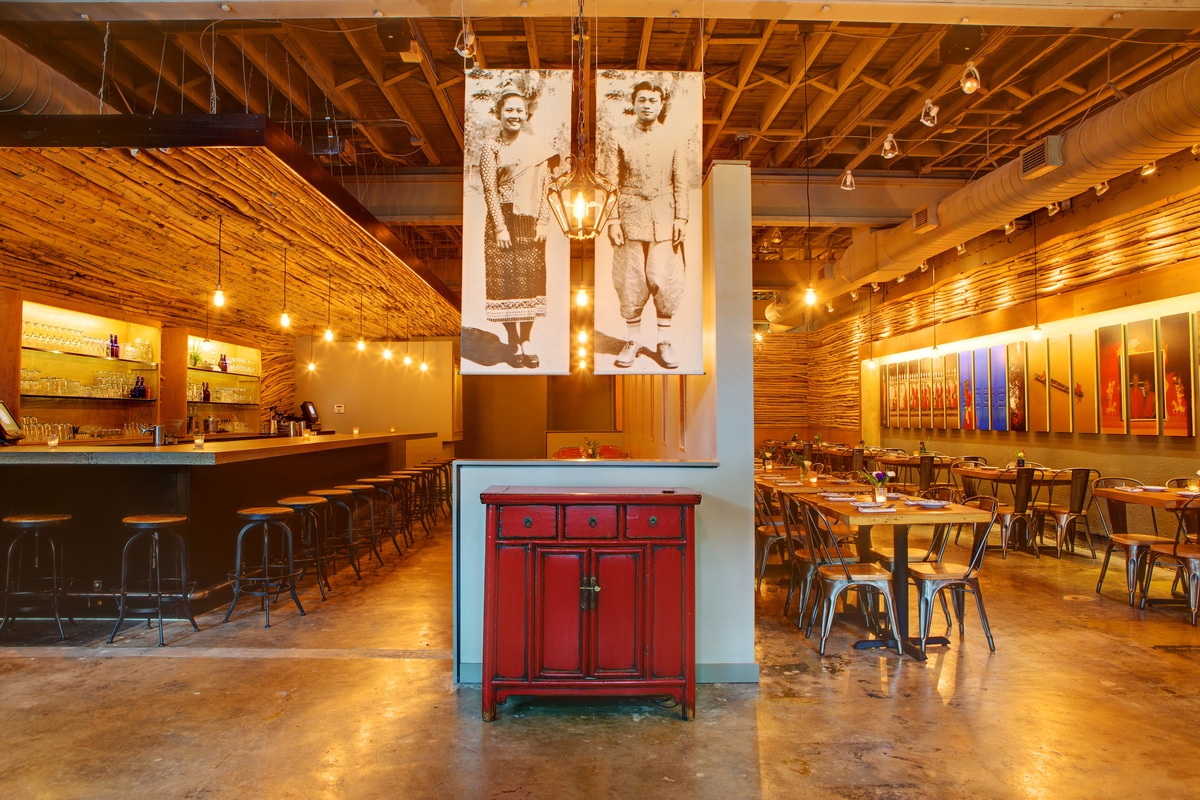
You know the movies about American high schools where everyone is comfortably cubby-holed into neatly organized cliques, hierarchically organized by commonplace definitions of what’s hot and what’s not until an exotic stranger arrives and turns everything upside down? That’s kind of what happened to the Raleigh restaurant scene when Bida Manda arrived in the heart of downtown.
Before I knew anything about this Laotian newcomer I saw it sandwiched between a well-established Irish pub and a reverberating music hall, glowing with an inviting light. I first spied this ghostly apparition late on a Friday night, when my elbows chain-linked me to my friends as they pulled through a throng of concert-going hipsters sipping PBRs who had spilled onto the street. Before I could learn more, it disappeared into a cloud of cigarette smoke. During Restaurant Week, murmurs about a new Southeast Asian bistro starting surfacing, with a resurgence of rumors when Maneet Chauhan, a Food Network chef featured the less-than-a-year-old restaurant on her new “Cutting Edge” reality show.
As a lover of Southeast Asia and an avid investigator of apparent mysteries, I scheduled a meeting with the owner of Bida Manda before I had even tasted their food. The young, energetic man who greets me does not turn me away when I admit this embarrassing fact and instead, gets me settled at a sunny spot by the window. He excuses himself to fetch tea and I check out my surroundings in the simultaneously exotic and unmistakably homey atmosphere.
Peppy sounds of French jazz and purple flowers in mason jars brighten sturdy tables made of salvaged church doors from the neighboring town. Exposed bricks reveal a vintage “Royal Crown Cola” painting on one wall while tapestries of saffron-clad monks adorn another. Vansana Nolitha, who co-owns the restaurant with his sister Vanvisa, returns with a pot of organic jasmine tea and directs my gaze up to life-size portraits of his parents, displayed prominently over the host stand. Smiling proudly, he explains how he created the restaurant in their honor.
“Bida Manda means mom and dad,” he explains. “We created the space with the idea that it is not just going to be about food, it’s about a family, not even about Laos, it’s about a family selflessly caring about one another, going through hardship and sending their kids away”.

Owners and siblings, Vanvisa and Van Nolintha, at Bida Manda Laotian Restaurant in Raleigh, NC. Photo courtesy of Lissa Gotwals.
The Story
Vansana pours the tea and starts to share his story. At age 12, his parents sent him and his sister to North Carolina to learn English, where he stayed to complete degrees in chemistry, design and world religions at North Carolina State University. It took him awhile to reconcile these diverse influences and realize he had been involved with so many stories, he wasn’t dealing with his own.
He says, “I decided to focus on my own story of what it means to be a Laotian American in America and what does that mean to be in the public space with no cultural identity.”
America’s unhappy history with Laos during the Vietnam War had essentially erased mentions of Laos during that time period from the libraries, leaving people like Vansana feeling conflicted about living in a country that did not honor their heritage.
In a burst of inspiration, Vansana and his sister decided to open a Laotian restaurant and fly home to spend a summer with their parents to become re-immersed in the culture they wanted to share with Raleigh. His parents did not have restaurant experience beyond owning a small boutique hotel, but since hospitality and food form the heart of the Laotian culture, opening a restaurant would truly allow him to return to his roots.
“Rice in Laos is ‘khao,’ which means to come together and almost means white, symbolizing purity and clarity,” Vansana describes. “So that concept of food, company and being present at a dining table is seen as a sacred way of coming to clarity or enlightenment. It’s the heart of that tradition. If you speak to any Laotian person, that is not a discipline, it’s a lifestyle. My sister and I are so lucky to have a career that is essentially the way we live every day”.
The Nolintha siblings returned to the United States with no management experience, a small budget and big dreams, which the support of the community helped make a reality. With surprising eagerness and generosity, Raleigh residents embraced this new restaurant, even though it unabashedly stands by its Southeast Asian traditions. Over 50 volunteers hand-tied North Carolina sticks to the walls for decoration and welcomed Buddhist monks to chant and clean the space in preparation for opening.
“Laotian and Southern hospitality are fascinatingly similar,” says Vansana. “I think that’s why, even though it is such a foreign cuisine, it is so relevant here. It was pretty immediate in our design context that this restaurant was going to be as much about Raleigh as it was about Laos because I’ve spent half my life here… we want this place to be a conversation about the intersection, which is what Lisa and my life has been”.
Even though Raleigh embraced this vibrant cultural destination with open arms, the foreign policy between the two countries doesn’t reflect that. For example, the unresolved immigration policy prevents Vansana’s parents from visiting. With Hilary Clinton’s recent visit to Laos (as the first higher level US diplomat since the war), Vansana hopes the situation will improve. In the meantime, Vansana is proud to play a role.
“Now, to Raleighites, Laos is not a foreign concept,” he says. “It tastes like something, it smells like something, it sounds like something- we haven’t seen any formal changes but we are happy to be involved in the process of telling our stories to graceful men.”

Ginger, lime, peppers, basil… common ingredients used in Laotian cooking, including at Bida Manda. Photo courtesy of Peter Taylor.
The Food
Finding a Laotian chef in the South wasn’t easy, but thanks to Craigslist, Vansana found a perfect match with Chef Lon Bounsanga. Born in Laos, Bounsanga received the majority of his extensive formal training in Western fine dining restaurants — most recently, Carolina Country Club — but cooking Laotian food for his five kids throughout made it easy to return to his roots. When deciding on a menu, the team wanted to introduce a foreign cuisine in a Southern culture that was graceful, fun, causal and exciting. After numerous taste testings, the most popular dishes simply reflected Loatian home cooking.
Chef knows how to deliver these home cooked dishes with artful presentation and contemporary riffs on traditional food. As a landlocked country covered by mountains and forests, Laotian food features a cornucopia of fresh fruits and vegetables with staple ingredients like bamboo shoots, cilantro, coconut milk, fresh ginger, kaffir lime leaves and lemongrass. The innate international influence on Laotian cuisine makes even “simple dishes” exotic and exciting. This small country absorbs inspiration from neighboring culinary giants like Thailand, China and India with a French colonial flair to create flavors where “layers of civilization interact in waves.”
A couple days later I return to the restaurant to experience this potpourri of flavors for myself, bringing along an open-minded friend Jereon from Amsterdam. Although he has no idea what to expect from Laotian food, he immediately feels excited upon entering the packed restaurant and absorbing the festive atmosphere, abuzz with conversation as the Nonlitha siblings flutter around tables to greet guests, periodically shuttling candle-lit macaroons to people with something to celebrate.

Green Papaya Salad with Flatiron Steak at Bida Manda Laotian Restaurant and Bar in Raleigh NC. Photo courtesy of Peter Taylor.
For our meal, we follow Vansana’s recommendations, crunching on complimentary shrimp chips as we begin with the ample-sized crispy lettuce wraps, a special dish he regularly eats at home. For the entrée, I choose Vanvisa’s favorite, the green papaya salad, which represents pre-Colonial cooking as farmers without much time to cook made meals by throwing together a few fresh ingredients they had on hand. Jereon opts for Vansana’s pick, mee ka tee or pork belly soup, a rustic, round, sauce-driven dish with layers of flavor representative of a high French influence.
With the delivery of my dish, the informative waiter explains how to eat it the traditional way by pinching a small portion of sticky rice, papaya and vegetable between three fingers. Immediately, the trinity of flavors of palm sugar, citrus and fresh sauce pops in my mouth, and my eyes widen, amazed that such simple ingredients can set off culinary fireworks. As I am a vegetarian, Jereon serves as my taste buds for the crispy pork belly soup and he’s so busy enjoying the hearty and comforting dish, it takes him awhile before he describes the spice accentuating the coconut curry base and crunchy meat. We search our stomachs for space for dessert but are so thoroughly satisfied we end with complimentary shots of kaffir lime juice, energized for a night on the town with this feisty splash of citrus.

Interior of Bida Manda Laotian Restaurant in Raleigh, NC. Photo courtesy of Peter Taylor.
In Review
As the excitement of tasting a new exotic cuisine fades into warm, fuzzy feelings of finishing a home-cooked meal, I look around the happy faces that surround me, reflecting on this experience. Talking to Vansana and tasting their culturally-immersive dishes answered many of my questions, but other aspects of the aura of mystery became more impenetrable.
How can two siblings in their 20s with no prior experience in management create such an inviting space? Why do these unfamiliar dishes leave taste buds tingling with a tangible sense of the familiar, allowing visitors from all over the world to taste home in food that is nothing like they’ve ever eaten? Still trying to wrap my mind around this, I look over the hostess stand where “mom and dad” hang, watching mother’s lips curl into a shy Buddha-like smile. Some questions are best left unanswered, but in the meantime, I’m glad I have an excuse to come back.
They held a restaurant week through January 26, 2014, where you could sample Bida Manda’s delicious offerings at a discount during Triangle Restaurant Week. Fixed price menus include $15 for a 3-course lunch and $20-$30 for a 3-course dinner.

Jessica Festa is the editor of the travel sites Jessie on a Journey (http://jessieonajourney.com) and Epicure & Culture (http://epicureandculture.com). Along with blogging at We Blog The World, her byline has appeared in publications like Huffington Post, Gadling, Fodor’s, Travel + Escape, Matador, Viator, The Culture-Ist and many others. After getting her BA/MA in Communication from the State University of New York at Albany, she realized she wasn’t really to stop backpacking and made travel her full time job. Some of her most memorable experiences include studying abroad in Sydney, teaching English in Thailand, doing orphanage work in Ghana, hiking her way through South America and traveling solo through Europe. She has a passion for backpacking, adventure, hiking, wine and getting off the beaten path.








